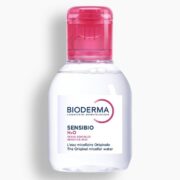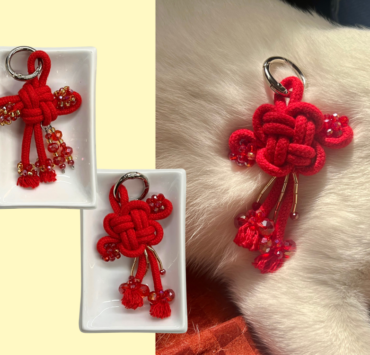Mind over mirror: The future of beauty is in your head
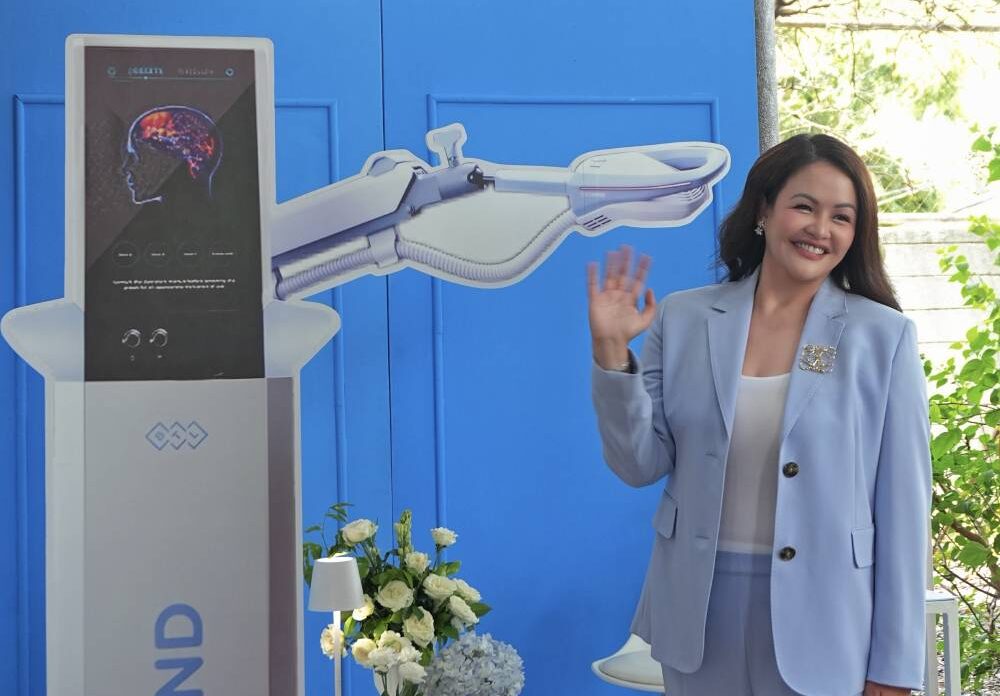
For Dr. Kristina “Kaycee” Cuevas Reyes, a UK-trained dermatologist, patient consultations often extend beyond skin rejuvenation. Her compassionate approach frequently leads clients to confide personal struggles, yet many hesitate when she suggests consulting a lifestyle coach.
Reyes notes a stark contrast: Clients readily invest P500,000 a pop in antiaging procedures, but resist a P25,000 counseling session for their mental well-being.
Being in the aesthetic medicine and regenerative medicine, she has witnessed how many internal illnesses manifest through the skin, leading her to pursue clinical dermatology and cosmetic surgery. But after giving birth and juggling clinics in BGC, Ortigas CBD, and Alabang, Reyes experienced burnout—an episode that transformed her medical philosophy.
Her experience with overfatigue, after managing three clinics and childbirth, profoundly reshaped her medical philosophy. Realizing that chronic stress can deplete vital brain chemicals such as serotonin and dopamine propelled her toward preventive medicine and mental wellness solutions.
In the Philippines, Reyes, founder of Luminisce Holistic Skin Innovations, became an early adopter of ExoMind. Her clinic, known for its pioneering whole-person approach to skin and wellness, positions ExoMind as a lifestyle tool for stress management.
She explained that chronic stress can cause harmful inflammation in the body. ExoMind directly targets the brain’s dorsolateral prefrontal cortex, a key area for discipline and mood regulation, to regenerate neural connections and boost serotonin and dopamine production. This process helps to override the body’s stress “alarm signal.”
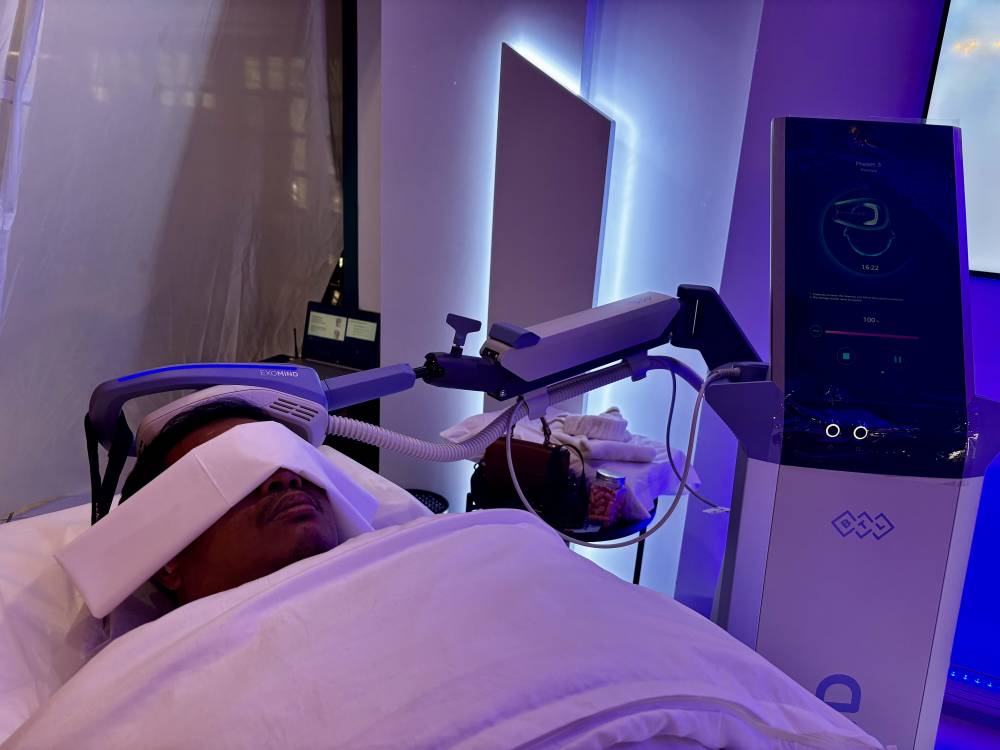
Magnetic therapy
Developed by Prague-based medical technology firm BTL, ExoMind is the next-generation magnetic therapy device that addresses symptoms of depression, anxiety, brain fog, and compulsive behavior. Its core technology is ExoTMS, a newer and more refined version of traditional transcranial magnetic stimulation that uses gentler, more targeted magnetic pulses to help treat mental health conditions more quickly and with fewer side effects.
Each session of ExoMind lasts under 30 minutes, requires no medication or sedation, and is well tolerated. The treatment, launched in early 2025, holds US Food and Drug Administration clearance for depression and broader approvals in Canada and Europe, reflecting Luminisce’s mission to address not just skin concerns, but the underlying stress, burnout, sleeplessness, and bingeing.
At the press launch of ExoMind, pioneering psychodermatologist Dr. Antonio Sison, who focused on the mind-skin connection, said he sees a big shift in the beauty world. It’s moving from just looking good to “wellness beauty,” mixing physical appeal with mental health. This trend is fueled by the growing field of psychodermatology, a deeper understanding of how the brain and skin constantly interact. New studies in skin health are pushing this wellness idea to cover both skin and brain.
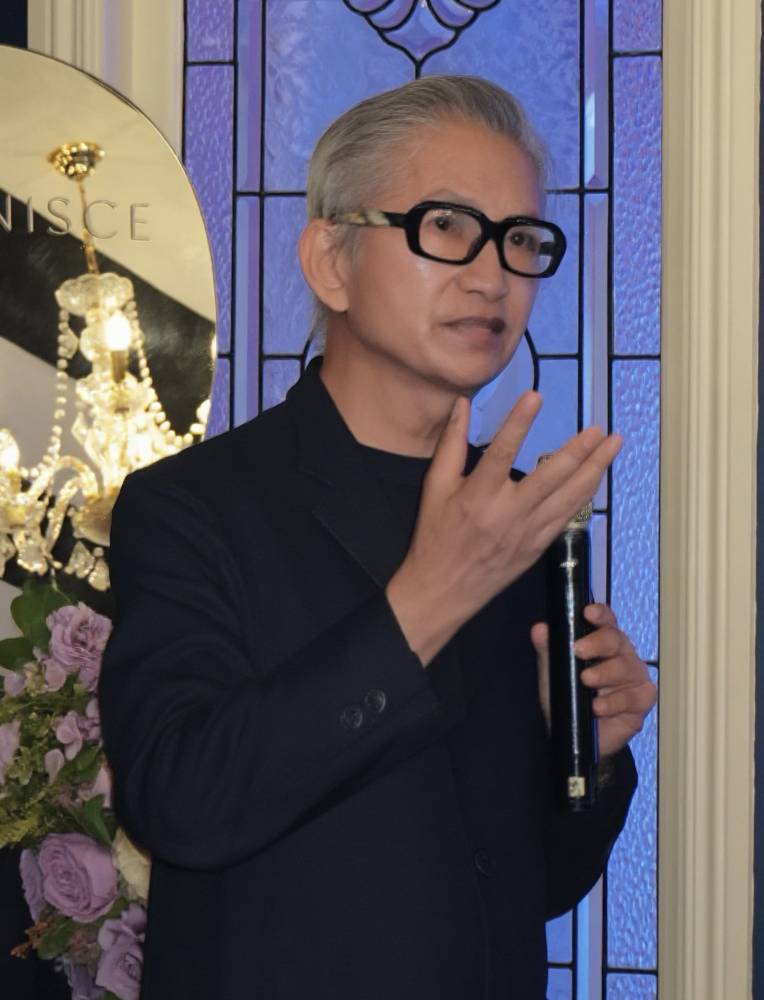
Undiagnosed issues
This broader approach makes sense when you look at why people get aesthetic work done. Sison points to US data from Dr. Louis Cady, an American aesthetic psychiatrist, showing that a significant 50 percent of these patients meet the criteria for a psychiatric disorder. This includes a notable number with body dysmorphic disorder (obsessed with perceived flaws in their appearance that are often unnoticeable or appear minor) in as many as 50 percent of cases. A staggering 72.4 percent of those getting elective plastic surgery (surgery for personal or vanity reasons) in the US have psychiatric conditions, with depression and generalized anxiety making up 44 percent of diagnoses.
These figures suggest many aesthetic patients might have undiagnosed psychological issues, from mild anxiety to more serious conditions. Sison’s observations highlighted a critical need for aesthetic doctors to consider patients’ mental state, recognizing that true beauty includes both physical and mental health.
Sison identified a “gap:” Patients seeking aesthetic fixes are often reluctant to see a psychiatrist. This can lead them to chase endless treatments without tackling the core issue. Hence, he champions “wellness beauty” that includes “brain wellness.” Offering interventions such as a relaxing, 25-minute session with a device like ExoMind could be a more appealing step than a direct psychiatric referral, though he underscores the technology is not a substitute for professional or clinical counseling.
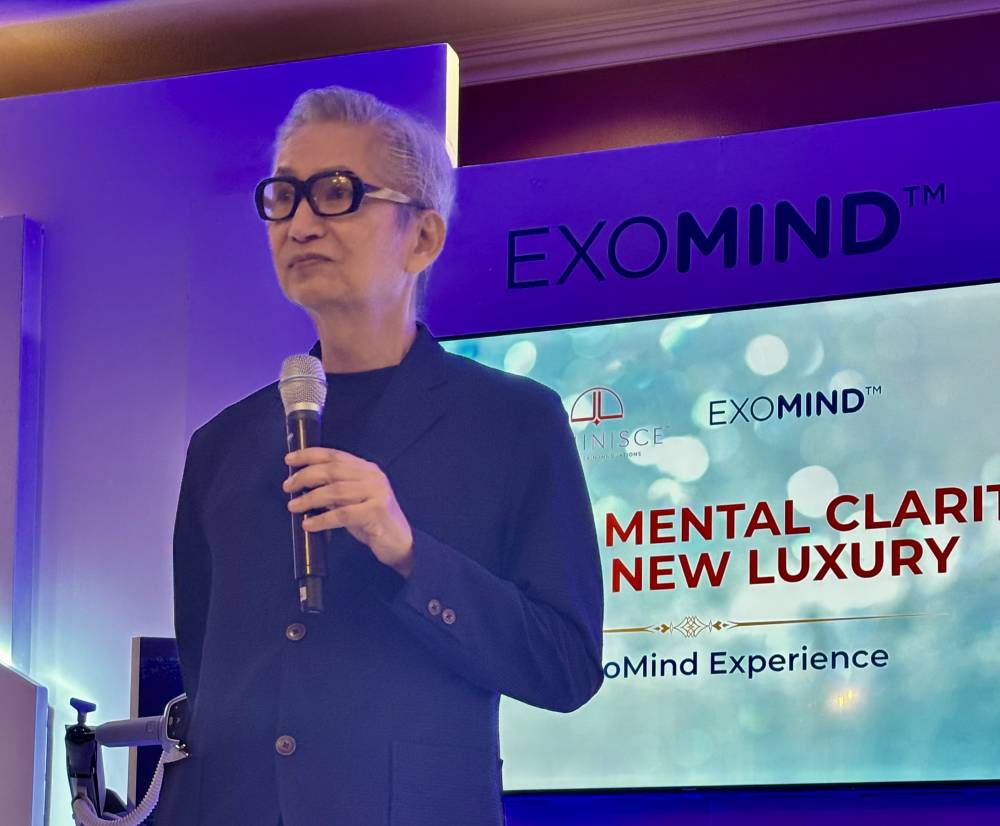
Historically, transcranial magnetic stimulation (TMS) was developed in 1985 to safely stimulate specific brain areas, and eventually became the groundwork for therapeutic uses. This noninvasive approach offers a more accessible path to mental well-being for patients.
Sison explained that TMS technology “stimulates neuroplasticity” in the brain. This process invigorates neurons, allowing them to fire more synchronously and leading to a more positive state of mind. The benefits, Sison said, extend to overall mental well-being. These findings have been presented to medical professionals and are supported by evidence-based studies.
Sison cited a study where just four 20-minute treatments, administered five days apart, showed significant improvements. Participants starting with low mental well-being progressed to moderate, and those with moderate advanced to high. These positive effects were sustained in follow-up assessments.
For depression specifically, participants reported an 80 percent improvement in mental well-being, with reduced depression and anxiety, improved mood, more positive speech, and notably, easier sleep—a significant benefit, given widespread sleep disturbances.
Addressing food cravings
The treatment also garnered high patient satisfaction, with 77 percent reporting contentment. An impressive 87 percent felt good after treatment, and 80.6 percent reported feeling calmer. Sison underscored that the study recorded “no serious adverse reactions.” He also presented data on its potential for addressing food cravings, with 71 percent of participants showing improvement.
He detailed the TMS-based procedure as comfortable, typically involving four to six sessions, once or twice weekly. He highlighted the device’s three settings, accommodating needs from general stress management in healthy individuals to clinical applications for those with OCD or depressive disorders.
While TMS serves both aesthetic and psychiatric patients, Sison foresees a larger potential client base within aesthetics. However, he cautioned that ExoMind isn’t suitable for everyone. Patients require screening and must consult their pharmacologist if on medication. They should limit caffeine before sessions and avoid the procedure if they have metallic objects near the head (cochlear implants or certain dental fillings), implanted brain or heart devices, a tendency to seizures (as the device lowers seizure threshold), or are on anticoagulants.
It’s also not suitable for those with severe medical conditions, hemorrhagic conditions, tumors, fever, pregnancy, suicidal tendencies, medication resistance, or recent medication changes. Essentially, the therapy is primarily for healthy individuals.
Sison ultimately affirmed that while innovative technologies like ExoMind are advancing aesthetic care toward holistic brain-skin wellness, the trust between patient and doctor remains paramount.













